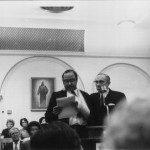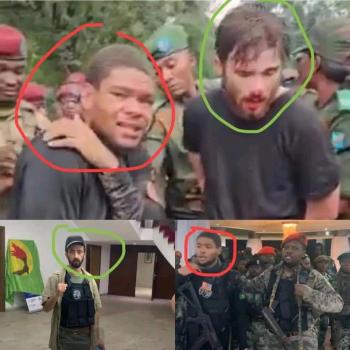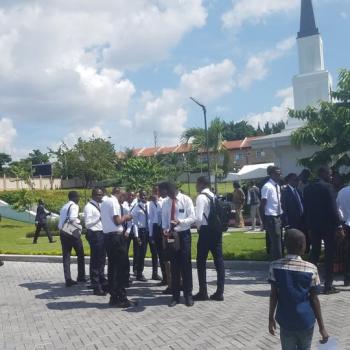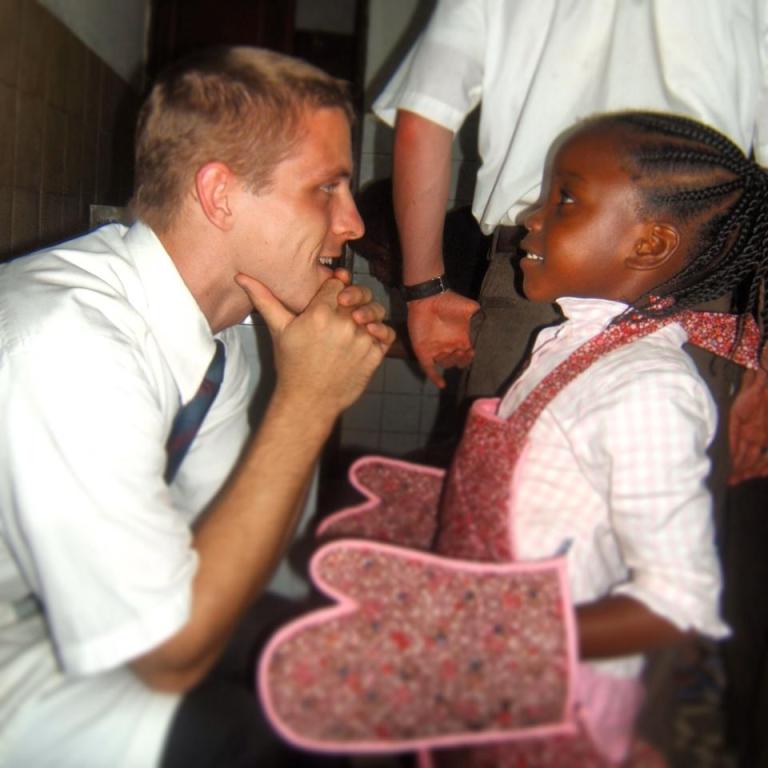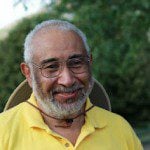
This is from the book Darius Aidan Gray and I wrote, The Last Mile of the Way.
Every face Aidan saw in Provo, Utah was fearful. Some of the women tried to look inconspicuous as they clutched their purses until he had passed them. The tension between everyone else and him was thick as gruel. His next task was to find a place to stay. For the first time since leaving Colorado Springs, he realized this would be no simple matter. It took many hours and a good supply of luck to find the Hotel Roberts, an old building that put up railway and Forest Service workers, and just about any other somebody who was pinching pennies.
About all Aidan had was pennies, and they’d soon be gone.
He bought a newspaper and began calling the numbers in the “Help Wanted” ads. Over the next days, the same thing repeated itself over and over again: He’d call about a job and get told it was still available. When he’d arrive to make his application, though, the employer would stiffen and say the job had been claimed.
More than once, he protested. “But I just talked to you fifteen minutes ago.”
Everybody must’ve memorized the same script: “I was mistaken. I thought it was available, but I found out one of the managers promised it to someone else.”
It took over a week, but at last someone did give him a job. It wasn’t a job you’d choose except in desperation, but desperation was Aidan’s casual companion at this point. Any job meant some money and independence. He would work alongside nine other young men, several Hispanic and several white, to tear down houses so a hotel could be built in their place.
He knew full well that if Elsie saw him on one of those ancient roofs without a lick of safety equipment between him and gravity, she’d die on the spot and belt him good on her way to heaven. She’d likely say something he’d heard before: “I ought to slap you so hard, your lips will make a natural turtleneck.”
How he longed to hear her say that or anything else, for he did miss her. But he also enjoyed being independent and earning his own keep. What he did not enjoy was being perched on one of those steep roofs like a bird without a single feather, let alone a set of wings except what God might provide should Aidan fall to his death. Such was his job, though, and the job of those other nine men.
In the beating summer sun, they’d hack through shingles and rafters using crowbars, hoes, and sledge and claw hammers. With every hit, the dust would rise all around them in a gritty, blinding cloud. Aidan could hardly take a breath without his throat getting scratched. Dirt and dust was so thick, he couldn’t see where he was stepping, and he prayed God to keep him safe. Elsie had always told him God preserved him for a purpose. He doubted that purpose was tearing apart a Utah roof.
The foreman’s name was Don, but Don wasn’t the boss. Bossman was Coz, a ruddy fellow who wore striped overalls and a railroad cap to cover his shiny, pink head.
After a few days on the job, Aidan asked Coz when his first pay- check would arrive, as he wanted to pay his bill at the Hotel Roberts. Coz flicked him a glance and said the paperwork hadn’t gone through, then he gave him a ten to tide him over.
The next week, Aidan asked again. The answer was the same. This time, Coz gave him a five and told him to keep on working.
The answer didn’t change the following week, nor the one after that, and finally the foreman noticed and asked Aidan if he’d got his pay yet.
Now, this foreman was a hulking, sunburned returned missionary. He had served in Texas and later married a Mexican woman, and he would not abide prejudice. He had seen enough of it, and he recognized it straight off. When Aidan told him what Coz had been doing, Don announced that they’d talk to him—immediately.
Now Aidan hesitated. He felt all the conflicts of his blood. Louis Gray, his great grandfather, had lived most his life as a slave, and at the moment, Aidan was experiencing something like slavery. Derrus’s temper flared in him, but so did Elsie’s concern. He could almost hear her pray, “Dear Lord, don’t let anybody get hurt.” He saw every risk in what Don was suggesting, and those risks were bad as climbing tall buildings without a safety net. He did not want to lose his job; it had been hard enough to come by. Besides that, Aidan was the only Negro in ten miles. He knew anything could happen.
“I’m sure there’s just some delay,” he said, imitating Elsie’s way of soothing tension. “No need to raise trouble. Let’s give it some time, Don.”
“No, we’re settling this right now. You should’ve gotten your pay same as the rest of us.” Don motioned to the other workers.
This was the moment of choice, and Derrus’s example stood silent and calm in Aidan’s mind. Yes, it was time to stand up before his dad, before Coz, before himself. He took a deep breath and felt ready. Then all of those men—Aidan smack in the middle—walked out of the heat and into Coz’s air-conditioned office.
Coz looked up from his plate of potato salad. “Boys?”
“Coz, do you intend to pay this man?” Don asked. The others made a path for Aidan. He felt himself getting pushed to the front. Coz stood up, looked his foreman direct in the eyes, then glared long at Aidan. Seemed Coz intended to shrink him with his eyes, but Aidan just felt taller and prouder. He knew who he was and what he had earned.
“Do you?” Don repeated.
A full five seconds passed before Coz answered, “No, I don’t.”
The foreman had twice the shoulder width Coz did, and he moved a step closer to prove it. “What did you say?”
“You heard me. I’ve been catching it from all my friends for hiring a night fighter anyway. This boy should be grateful for any kind of a job, and he shouldn’t be trying to set you all up for a riot. We don’t need that around here.”
Though Aidan felt tall and capable and sensed the strength of his heritage every whit, he was wearing the harmless half-smile he had practiced all his life. He would continue to wear it most of his days in Provo. Only his closest friends would see what lay behind it.
“That’s it, then,” said Don. “Men, we’re dragging up here. Coz is going to have to find some new workers. There are one or two conditions I won’t tolerate and one or two lines I won’t see crossed. Aidan, you get in my car. We’re all of us heading up to Salt Lake. I believe you have some papers to fill out at the Labor Relations Board.” He turned one last time to Coz. “Congratulations,” he said, “you just landed a claim on your hands.”
All nine of those workers went with Aidan to that bureau in Salt Lake, and he filed his claim, feeling satisfied and justified. Derrus would have been proud of him.


